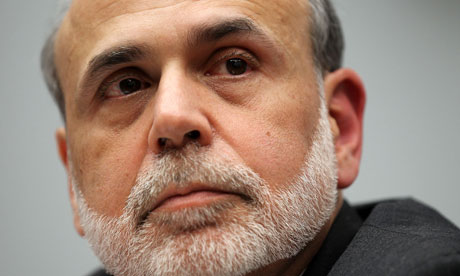
Federal Reserve chairman Ben Bernanke will address central bankers at Jackson Hole, Wyoming on Friday. Photograph: Alex Wong/Getty Images
Federal Reserve chairman Ben Bernanke will face intense pressure to announce new measures to calm the world's frenzied financial markets this week, as central bankers hold their annual summer retreat in Jackson Hole, Wyoming.
After a tumultuous week, which saw billions of dollars wiped off share prices on both sides of the Atlantic, investors will be hoping for a signal that the Fed has more policy options to tackle the crisis.
Bernanke is due to speak on Friday, on the topic of "Near- and Long-Term Prospects for the US Economy". He used his speech at last year's gathering to pave the way for "QEII", the Fed's second round ofquantitative easing, the radical policy of pumping electronically created money into the economy to avoid deflation.
However, analysts warned that having already announced a two-year interest rate freeze – a move that caused markets to rise for just five days before plunging back into the red – Bernanke may have little new to say.
"We'll probably get some nice soothing words," said Paul Dales, US economist at consultancy Capital Economics. "He may well say they've still got the tools to do more, but that will be about it."
The Fed is facing growing political disquiet among rightwingers, such as the prospective Republican presidential candidate Ron Paul, who argues that the Washington-based bank is too powerful and should be brought to heel.
China, the world's largest holder of US Treasury bonds, has also been fiercely critical of the Fed's policies, with Beijing warning that restarting quantitative easing will undermine the value of its dollar investments.
Sir Mervyn King, who has criticised the Fed's decision to announce thatinterest rates will stay low until 2013, will also attend the meeting, hosted each year since the 1970s by the Kansas City Federal Reserve.
Hopes of a fresh round of quantitative easing in the UK were boosted last week when it emerged that the Bank of England's monetary policy committee voted unanimously to leave interest rates on hold this month. Bank chief economist Spencer Dale and external expert Martin Weale had previously voted for a rate rise.
Central banks have been the first line of defence throughout the credit crisis, and the European Central Bank has been drawn into buying the bonds of embattled states including Greece, Italy and Spain, plus providing low-cost emergency loans to struggling banks.
Rumours about the health of Europe's banks contributed to last week's sell-offs, and the ECB announced that it had lent $500bn to one financial institution. Banking analysts at RBS said in a research note, "we continue to see short term US dollar funding availability as a key strain for European banks."
No comments:
Post a Comment